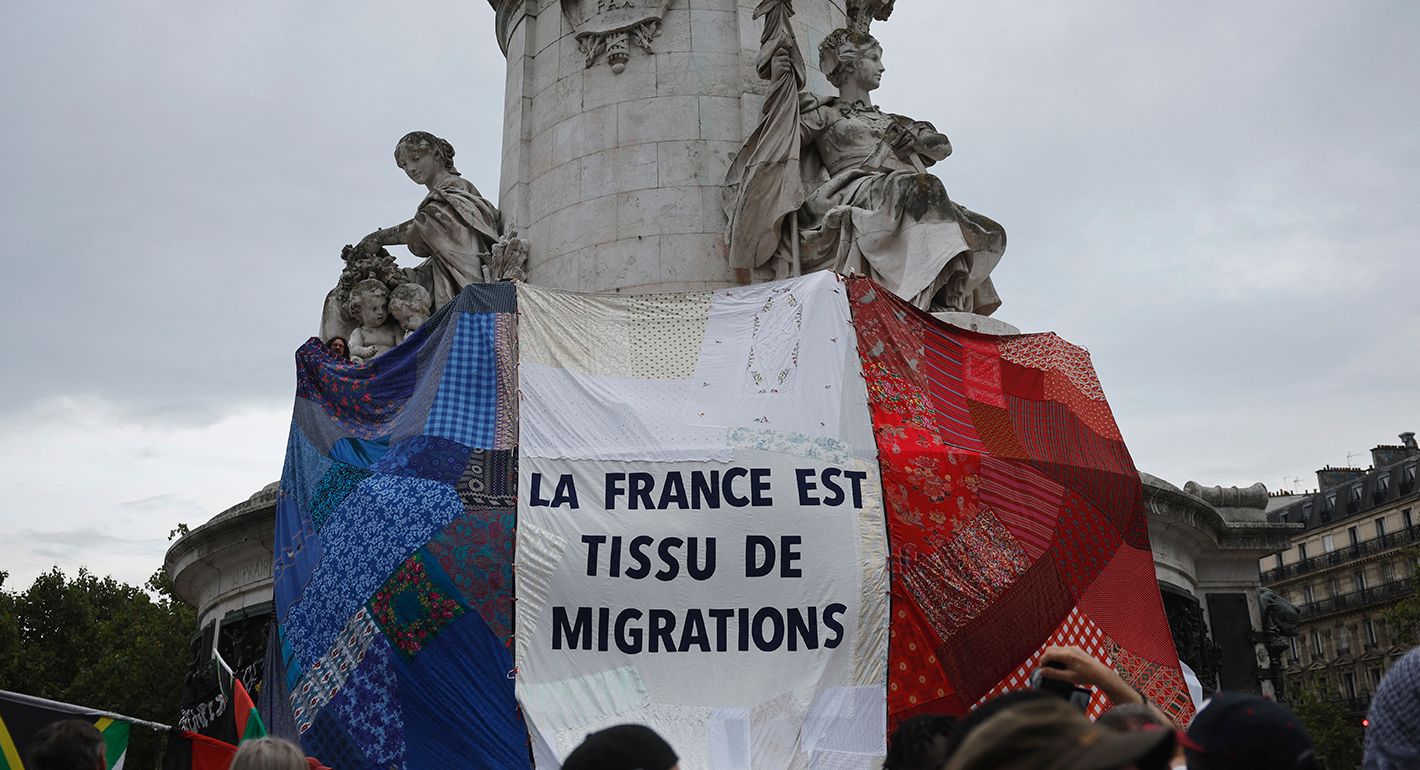In an interview, Yasmine Zarhloule discusses irregular migration to Europe and the shortcomings of a securitization policy.
Rayyan Al-Shawaf
{
"authors": [
"Yasmine Zarhloule"
],
"type": "commentary",
"blog": "Diwan",
"centerAffiliationAll": "",
"centers": [
"Carnegie Endowment for International Peace",
"Malcolm H. Kerr Carnegie Middle East Center"
],
"englishNewsletterAll": "",
"nonEnglishNewsletterAll": "",
"primaryCenter": "Malcolm H. Kerr Carnegie Middle East Center",
"programAffiliation": "",
"programs": [],
"projects": [],
"regions": [
"France",
"Western Europe"
],
"topics": [
"Migration"
]
}
Nevertheless, recent European and parliamentary elections have fed an increasing struggle over belonging.
Earlier this month, President Emmanuel Macron announced a snap parliamentary election following the defeat of his Renaissance bloc in elections to the European Parliament weeks earlier. This led to speculation about the fate of democracy in France, Macron’s strategy, and the implications for the National Assembly of the shifting coalitions on the left and right of the political spectrum. It also raised questions about the role of immigration, particularly Muslim immigration, in shaping voters’ decisions.
As expected, Marine Le Pen’s far-right Rassemblement National (RN), or National Rally, scored an unprecedented 31 percent in the European elections. Despite its subsequent retreat in the parliamentary elections, the party went on to lead the European Parliament’s third-largest group, Patriots of Europe, forged by Hungarian Prime Minister Viktor Orban. Throughout these events, and ahead of the presidential election in 2027, the RN has continuously instrumentalized migration in its rise to mainstream politics. Its efforts to “stop the flood of immigrants” has sent shockwaves through French society and beyond, impacting immigrants, mostly from Muslim and African countries, and their descendants.
The normalization of anti-immigrant rhetoric in France is not new and certainly did not begin with the latest European elections. Exclusionary discourse evolved in various forms and contexts. During the 1980s, it was visible in a debate focused on the access to French nationality for postcolonial immigrants who had settled in France, and their children born in the country. In the 1990s and 2000s, it was focused on social problems in the “banlieues,” or suburbs, and the way this was associated with Islam. And again, since 2015, it has touched on asylum seekers and refugees entering Europe.
In the period leading up to the 2012 presidential election, immigration took central stage. In particular, the so-called Gueant Circular, introduced in May 2011, sought to restrict non-European Union students’ right to work and remain in France following the end of their studies, lowering their number from 200,000 to 180,000 per year. While the circular and its analogous laws were abolished in May 2012 under then-president Francois Hollande, anti-immigration discourse continued to gain prominence in French public discourse and media outlets.
According to a study conducted by Ipsos in May of this year, ahead of the European elections, immigration was the second major factor in voters’ decisionmaking. The poll asked, “Among the fifteen choices below, which are the three issues you will consider the most in your vote in the European elections?” Thirty-three percent of respondents listed immigration, below purchasing power at 45 percent. However, among those who voted for the far-right, as well as electors of the conservative, post-Gaullist Les Republicains, immigration was the primary concern. The far-right’s success in exploiting the immigration issue has derived from its ability to merge anxieties over immigration with other problems, including the absence of economic opportunities, access to public services, safety, and so on.
France counts some 7 million immigrants, or 10.3 percent of the population. In 2021, 48 percent of France’s immigrant population came from Africa, and 62 percent of African migrants came from the Maghreb, or North Africa, a trend that has been stable since the 1980s. When accounting for their descendants, France’s immigrant community is vast and heterogenous, making it difficult to assess their voting patterns without specific data on ethnicity, class, location, and gender. However, the general political and social climate in recent months, following a decade of divisive discourse, has reflected an increasing struggle over belonging.
In a study titled “Feelings about Migrant and Belonging” published in 2023 by the Institut National de la Statistique et Des Études Économiques (INSEE), the French national statistics bureau, 44 percent of immigrants regarded their conditions in France to be better than in their country of origin, while a consequential 29 percent stated the opposite. According to the report, the descendants of immigrants tend to be particularly favored relative to the national average when it comes to education, social status, and professional advancement. With respect to belonging, respondents were asked if they “felt at home” in France. Here again, a majority said that they did, with 76 percent of the descendants of immigrants and 63 percent of immigrants responding in the affirmative.* Yet, on the question of whether they were “seen as a French,” despite being born in France and holding French citizenship, 20 percent of descendants said they were not. Among the latter, the majority were of African or North African descent.
While these findings challenged the caricatural portrayal of immigrants as being unable to integrate that is often deployed by far-right politicians and their supporters, racial discrimination and examples of hostility persist despite social mobility. Moreover, economic integration does not always track with social inclusion. Similar conclusions were also reflected in another comparative study titled “Trajectories and Origins,” carried out by the Institut National d’Études Démographiques and INSEE, published in 2016.
Concerns over the language of the far-right and its potential ahead of the 2027 elections is, therefore, rooted not only in immigration. It also extends to central issues of discrimination in the workplace, based on Maghrebi-sounding names for example, leading to extended periods of unemployment and increased chances of precarity. In 2021, the Institut des Politiques Publiques, a French public policy institution, reported that people of Maghrebi origin, or who were perceived as such, were 31.5 percent less likely to be contacted by recruiters when seeking employment.
Racial profiling is another practice that can hinder feelings of belonging and takes place beyond the workplace. This is a longstanding issue in the country where young black or Arab males are reported to be twenty times more likely to be stopped by the police. In 2024, five French and international groups sought to address endemic racial profiling and filed a complaint with the United Nations Committee on the Elimination of Racial Discrimination.
France’s latest elections undoubtedly reflect a polarized domestic political scene. Given the far-right’s victory in European elections, immigration is regarded, not surprisingly, as a central national preoccupation. However, the reality is that it is tied to other issues, such as a sense of belonging to France, justice, and the reality of discrimination. There have been successes in improving the situation, but the challenges to national unity persist.
* This sentence was changed because of an error in the original.
Carnegie does not take institutional positions on public policy issues; the views represented herein are those of the author(s) and do not necessarily reflect the views of Carnegie, its staff, or its trustees.
In an interview, Yasmine Zarhloule discusses irregular migration to Europe and the shortcomings of a securitization policy.
Rayyan Al-Shawaf
What happens in the Middle East will not be contained there, so the European Union should prepare for this by reaffirming its values.

H. A. Hellyer
The great divide we are witnessing today in the Middle East is, in part, the result of European interference.
Michael Vatikiotis
French envoy Jean-Yves Le Drian is wondering why some Lebanese parties reject a dialogue over a new president; fear may be a reason.

Michael Young
In an interview, Giovanni Fassina and Alice Garcia discuss why a controversial definition is penalizing support for Palestinian rights.

Michael Young